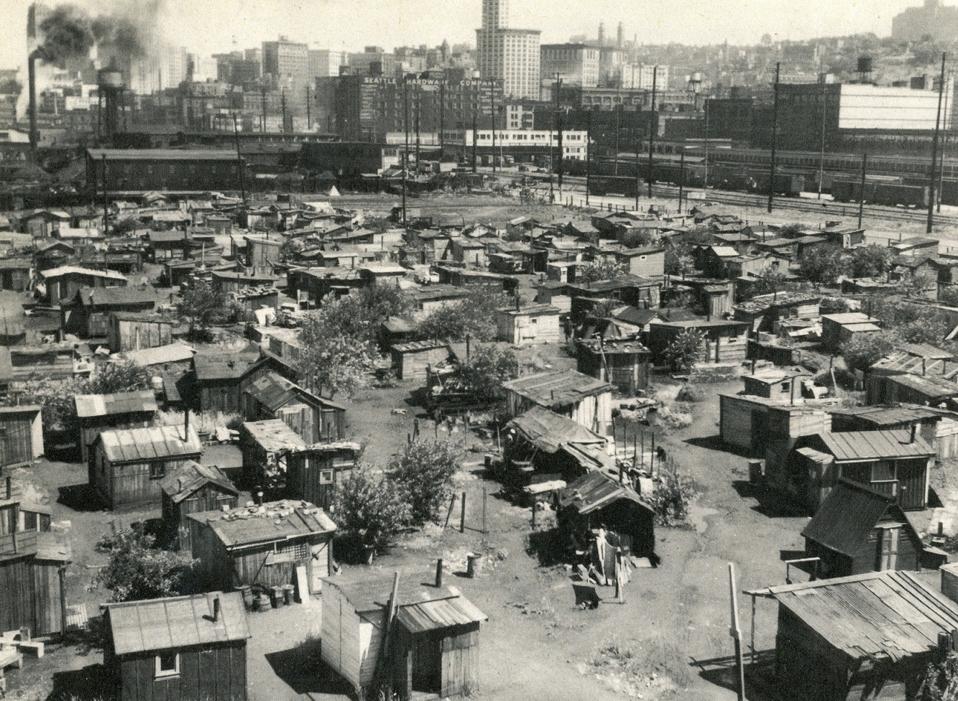The specter of economic displacement is rising in the U.S., with eerie echoes of the Hoovervilles that defined the Great Depression. Today, growing homelessness, stagnant wages, and declining affordability are converging with the political landscape shaped by Project 2025—a proposed policy overhaul that threatens to exacerbate these challenges. If implemented, the consequences could accelerate the emergence of “Trumpvilles”—tent encampments of economically displaced individuals—driven by policies that weaken social safety nets, restrict worker protections, and amplify economic inequality.
As Ezra Klein discusses in his podcast entitled “Is Trump ‘Detoxing’ the Economy or Poisoning it?” Trump’s economic strategy and his administration appears willing to push the economy into ‘a period of pain, maybe even a recession,’ in pursuit of long-term economic dominance.
The Economic Underpinnings of Modern-Day Hoovervilles
The forces driving today’s housing and economic crises are multifaceted. Homeownership is increasingly out of reach for middle-class Americans, rent prices continue to surge, and eviction moratoriums—temporary buffers during the pandemic—have ended. Project 2025’s proposed reductions in federal aid programs such as Medicaid, food assistance, and unemployment benefits could strip millions of critical resources at a time when inflationary pressures and stagnant wages have already squeezed working families. The Trump administration’s shift toward a mercantilist economic model, as discussed in Gillian Tett’s recent analysis, suggests that trade wars, fluctuating tariffs, and economic instability could disproportionately impact low-income and middle-class workers.
Simultaneously, labor market trends signal volatility. Automation, AI-driven job displacement, and corporate restructuring have increased job insecurity. If Project 2025’s pro-business deregulations move forward, including reduced labor protections and the elimination of DEI initiatives, businesses will face a new wave of worker discontent, potential productivity declines, and reputadiscontenttional risks.
Private Sector Responsibility: A Strategic Imperative
As policymakers debate sweeping changes, the private sector must recognize the direct impact on human capital management and long-term business viability. With economic instability on the horizon, companies must take proactive measures to mitigate risks and uphold corporate responsibility in the void created by the retraction of government oversight. Here’s how:
- Protect and Expand Worker Protections: Companies should commit to maintaining strong employee benefits, wage security, and job protections regardless of policy rollbacks. Sustainable workforces rely on fair compensation, stability, and access to healthcare—critical safeguards in preventing mass economic displacement. As financial experts have noted, the private sector cannot rely on the previous administration’s economic patterns. Wall Street, initially optimistic about a second Trump term, has grown increasingly wary of economic turbulence.
- Invest in Housing Solutions: Large employers—especially in high-rent urban areas—must explore public-private partnerships to expand affordable housing options for workers. This could take the form of employer-sponsored housing, housing stipends, or investments in community development projects to mitigate homelessness risks.
- Champion Workforce Reskilling and AI Adaptation: AI-driven job displacement is inevitable. Companies must take an active role in workforce development, investing in upskilling and reskilling programs to ensure employees remain competitive. Strategic partnerships with vocational training institutions and workforce transition programs can fill this gap. The administration’s unpredictability regarding tariffs and trade policies, which is described as ‘capricious and uncertain bullying,’ poses significant challenges for businesses trying to make long-term workforce investments.
- Maintain DEI and ESG Commitments: Project 2025’s rollback of DEI initiatives could lead to a talent drain and reputational risks for companies that scale back diversity commitments. Investors and consumers are increasingly scrutinizing corporate social responsibility, making it imperative to maintain inclusive hiring, equitable pay, and employee engagement programs.
- Lobby for Balanced Policy Approaches: The business community wields influence in shaping economic policies. Companies must engage in advocacy efforts that support a balanced economic framework—one that supports business growth without dismantling the economic safety nets that sustain consumer purchasing power and workforce stability.
Conclusion: Preventing a New Era of Economic Displacement
Tett’s analysis draws a stark parallel between today’s economic trajectory and the failed economic strategies of the 1930s, warning that power-driven economic policies could lead to unintended but catastrophic consequences. While Project 2025 proposes sweeping policy shifts, it is the private sector that will determine whether America faces a future of opportunity or one marred by “Trumpvilles.” Employers must recognize that stability, economic mobility, and human capital investments are not just moral imperatives but essential strategies for sustainable economic success. Those who fail to act now may find themselves confronting not just the humanitarian cost of economic displacement but the profound business risks of a collapsing consumer base and a disengaged, disillusioned workforce.

